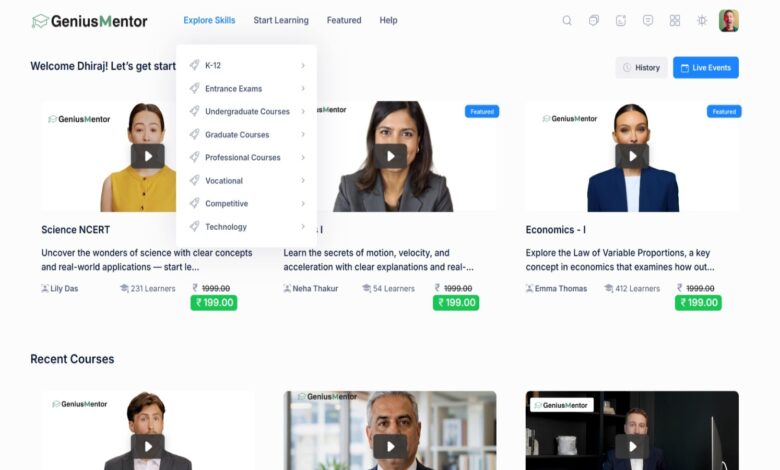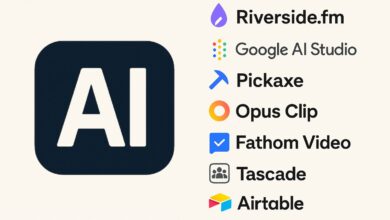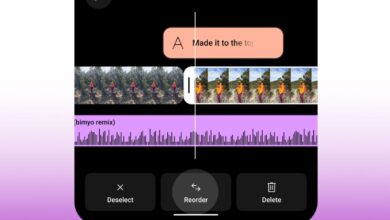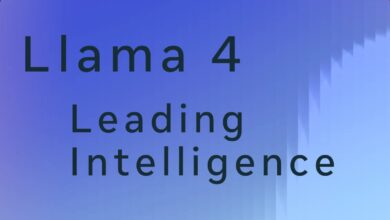This startup wants to make online education more personalised with avatars and AI | Technology News

During the height of the pandemic, India saw an ed-tech boom, with classes held digitally and teachers hosting sessions for free. A paid offering was available for students who wanted additional features such as homework and tests. However, as enrollment in these online classes grew, the cost of membership also substantially increased, creating a divide and cutting off children from less-privileged backgrounds from accessing education.However, a Delhi-based startup led a data scient is thinking differently to tackle this problem. It is introducing digitally created humans—virtual teachers or artificial intelligence-generated avatars—that will teach students anytime, testing a new approach to online education without human teachers.
This experiment sets the startup apart in the ed-tech space while reducing the cost of hiring star teachers, who often receive hefty paychecks from ed-tech companies, driving up coaching membership costs borne parents.
Story continues below this ad
Genius Mentor is an AI-powered Ed-tech platform leveraging generative AI technology. (Image credit: Genuis Mentor)
Started Mridu Andotra earlier this year, Genius Mentor, a SaaS-based platform, aims to disrupt traditional educational models offering quality education at affordable prices through generative artificial intelligence technology and AI avatars, which act as subject-specific teachers.
“We are an ed-tech company. We are providing education to the students, but we are using AI. We are purely using AI,” Andorra told , adding that Genius Mentor is a “personalised learning platform”.
“Each student in a class is strong in some subjects and weak in others. For example, some students may excel in mathematics but struggle with physics. Our platform analyses a student’s strengths, weaknesses, and learning speed to create a knowledge graph. Based on this data, it generates a personalised learning curriculum. It then identifies the key areas a student needs to improve on and helps them work on those concepts,” she explained, highlighting how the startup leverages artificial intelligence to achieve this.
Unlike traditional teaching methodologies, which focus on testing and grading students based on the chapters taught in class, Andotra’s AI-based system goes beyond that addressing students’ weaknesses, even if they stem from previous academic years.Story continues below this ad
“There is a possibility that a student in the 9th grade has weak areas that originated in the 8th grade because the concept wasn’t clear. Our platform identifies these gaps, pulls relevant prerequisite topics, and creates a knowledge graph. In this graph, the blue sections represent strengths, while the red sections highlight weaknesses. The goal is that the time students complete the course, their strengths are expanded, and their weaknesses are minimised as much as possible providing targeted content tailored to their weak areas. That is our main aim,” she explained.
Andotra said the approach she has taken is very data-heavy, and each report generated for a student will also be shared with their parents so they can understand where their child needs to improve. Andotra said it becomes easier for parents, teachers, and even students to identify weak points and focus on improving them generating a personalised report.
Its ability to adapt the curriculum based on individual needs and learning speed sets the AI learning platform apart. This ensures that students receive personalised attention rather than learning in a class of 60, mimicking the experience of hiring a private tutor for one-on-one learning.
Mridu Andotra (Founder and CEO) alongside other menbers of the team. (Image credit: Genius Mentor)
Andotra’s Genius Mentor gathers data from NCERT books, Arihant publications, and the web, training it using Large Language Models (LLMs) and using artificial intelligence to generate content, including lectures, notes, and quizzes. The web-based platform utilises APIs from a mix of open-course models like Visceral AI and Llama and closed models like GPT.Story continues below this ad
“The challenge is not training the data; rather, the bigger challenge for us is that every student has a different knowledge graph, and the content needs to be regenerated for each student repeatedly,” she said, adding that scaling to a very large level requires GPUs, and they need to make sure that the processing speed is fast enough without any lag.
Genius Mentor sets itself apart from other ed-tech players, perhaps because it has created AI avatars, meaning lessons will be taught AI-generated teachers who are available 24/7, allowing students to learn anytime. “These avatars are completely AI-generated. We have not taken a teacher’s video and created an AI avatar from it,” Andotra explained. “AI avatars will be interactive. They will point out your weaknesses,” she added.
But there are plans to introduce AI avatars of teachers on the platform, where Andotra’s team will work closely with educators—particularly those who give lectures on YouTube or run their own coaching institutes—providing them with a way to create and offer their own courses.
Students can access platform 24/7, learning at their own convenience. (Image credit: Genius Mentor)
Andotra agreed that having a teacher with years of experience offers an advantage. “We want to ensure that we are leveraging their strength while benefiting teachers. They can create a course that would have otherwise taken them a lot of time. using our platform, they can develop their courses, and we can become partners,” she explained.Story continues below this ad
Andotra added that it will function like a teacher AI marketplace, offering a 50-50 revenue model. Essentially, AI teachers can be customised with real teachers’ faces, allowing them to earn royalties. “At times, people purchase courses based on a teacher’s face value,” she noted.
The platform covers K-12 education (1st–12th grade) and also plans to offer courses for competitive exams like UPSC. Andotra said she wants to make online education affordable, which is why subscription costs are being kept between Rs 200 and Rs 500. For UPSC, pricing will be different, ranging from Rs 500 to Rs 800. Currently, the platform supports English and Hindi, with plans to expand to regional languages. It is in beta testing with a small group of students, with an official launch set for the second week of April.
“We have been able to lower the cost of courses because there are no humans [teachers] in the loop. We are not paying salaries to them. Everything we are doing is powered AI.”
Andotra’s team works with different schools, including Tagore International School in Delhi, to test the platform. “We are making it ready for school use. We are working on it, and with the teachers as well. It will most likely be completed May.”Story continues below this ad
“No ed-tech platform in India has ever quantified the advantage it provides to a student. Once we roll out our platform to schools, we will measure this impact through our personalised learning algorithm and learning capabilities. Our goal is to track student progress, and even if there is a 30 per cent improvement in scores, we want to capture that data.”
Andotra believes that teachers should not focus solely on creating lesson plans, as AI can now handle that well. Instead, the role of a teacher should be to guide students, interact with them more, and provide mentorship.
The platform will operate on a subscription-based model and include competitive exam courses as well. (Image credit: Genuis Mentor)
“A ChatGPT or other AI tools will not understand your personalised learning path or curate a personalised learning curriculum for you. Our AI platform does just that, and it does so in a holic manner,” she responded when asked about the advantage of her AI platform over freely available AI tools, where users can simply enter prompts and receive answers.
Andotra further explained that she is using Retrieval-Augmented Generation (RAG), a technique that improves the accuracy and reliability of generative AI models incorporating information from specific and relevant data sources. This means that whatever information or lessons students learn from AI avatars comes directly from the uploaded documents or books, in this case. “It will not give you anything from the web. The reason ChatGPT hallucinates is because it has an abundance of information,” she said.Story continues below this ad
“So, if a 9th-grade student uses the platform, they will receive content specifically from the 9th-grade curriculum. It’s not like we will teach PhD-level content and confuse the student, nor does our platform hallucinate,” she clarified.
Andotra has a team of five people working on the platform, including data scients, data engineers, UI/UX designers, and an investor helping to establish partnerships with schools and colleges. Andotra previously founded Future Analytics, a no-code AI/ML platform that secured $5 million in funding and was later acquired.







